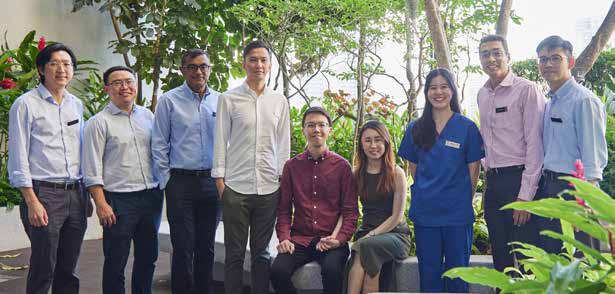
Mr Lim Wen Ming (seated) and Mr Lim Wen Cong (4th from left) with some members of their liver transplant team, including Professor Brian Goh, Associate Professor Prema Raj (2nd and 3rd from left) and Dr Thinesh Lee Krishnamoorthy (2nd from right).
SGH surgical team’s experience and skill in keyhole surgery were tapped to remove part of the liver from a live donor and transplant it into his brother, whose liver was failing fast.
In September 2021, public servant Mr Lim Wen Ming became critically ill with acute liver failure, triggered by a series of infections and complications that resulted from Wilson’s disease, a rare condition where copper builds up in the body.
The prognosis for the civil servant in his early 30s was dire and a liver transplant was urgently needed. Undergoing such a procedure for someone in Mr Lim’s condition would be “generally very risky”, said Dr Thinesh Lee Krishnamoorthy, Senior Consultant, Department of Gastroenterology and Hepatology, Singapore General Hospital (SGH).
“Wilson’s disease is rare and acute liver failure is also rare,” said Dr Thinesh, who is also Medical Director, SingHealth-Duke NUS Liver Transplant Centre.
The condition of patients like Mr Lim is often unstable. “During the operation, surgeons may have difficulties controlling the bleeding. The pressure around the liver can be very high and, even after surgery, there’s no guarantee that the organ can take hold,” he added.
However, Mr Lim’s options at that point were limited, unlike say kidney failure patients, who can go on dialysis while waiting for a transplant. When the issue of a transplant was raised, Mr Lim’s younger brother, Mr Lim Wen Cong, did not hesitate to step up to the plate. In October 2021, both brothers underwent their respective surgeries — the traditional open approach for Mr Lim, while his brother underwent a keyhole (also known as laparoscopic or minimally invasive) procedure to remove a portion of his liver.
Keyhole procedures benefit patients as the incisions are smaller — 1cm to 8cm versus 30cm to 50cm for open surgery — so patients bleed less, recover faster and have fewer infections and complications. They are also discharged quicker, said Professor Brian Goh, Head, Department of Hepato-Pancreato-Biliary and Transplant Surgery, SGH and National Cancer Centre Singapore.
 While keyhole is used these days as standard surgery for most abdominal surgeries such as for gall bladder, colon and stomach conditions, its adoption in major liver procedures has been slower. “It’s technically more demanding and the learning curve is steep even for experienced liver surgeons, who need to perform 60 to 150 keyhole surgeries to gain competency and mastery of the procedure,” said Prof Goh, who is also Surgical Director, Liver Transplant, SingHealth Duke-NUS Transplant Centre.
While keyhole is used these days as standard surgery for most abdominal surgeries such as for gall bladder, colon and stomach conditions, its adoption in major liver procedures has been slower. “It’s technically more demanding and the learning curve is steep even for experienced liver surgeons, who need to perform 60 to 150 keyhole surgeries to gain competency and mastery of the procedure,” said Prof Goh, who is also Surgical Director, Liver Transplant, SingHealth Duke-NUS Transplant Centre.
The Centre has performed 12 keyhole liver donor transplant surgeries as of November 2022 since it began adopting keyhole surgery in 2019, said Prof Goh. A comparison with 11 traditional open surgeries found the usual benefits — significantly less bleeding and a shorter hospital stay — while no difference was detected in the surgical outcomes of the recipients of transplants from donors who underwent either approach (only donors can opt for keyhole surgery; recipients have to undergo open surgery). “So, even in our early experience, we showed that laparoscopic donor hepatectomy can be adopted safely if you have sufficient experience in the procedure,” said Prof Goh.
A team of about 20 doctors and nurses operated on the brothers. The team included Prof Goh and Associate Professor Prema Raj, who heads the SingHealth Duke-NUS Transplant Centre. The keyhole surgery for the donor took about seven hours and Mr Lim Wen Cong was discharged four days later. Mr Lim Wen Ming’s open surgery took some 18 hours, and he was discharged in December 2021.
Mr Lim is grateful to his brother for giving him a second lease of life as it allowed him to witness the birth of his daughter in April 2022. “I count myself very, very fortunate because the waiting list for a donor organ is long and people may not be as fortunate as I was to be able to find a match that soon,” he said. Liver patients usually wait six to eight weeks for the Ministry of Health (MOH) to process and approve a transplant, but MOH approved the transplant request in just three days in light of his critical condition and as the donor was his brother.
For Mr Lim Wen Cong, his decision to donate his liver was driven by fears for his then-unborn niece. “I wouldn’t be able to bear seeing my niece without her father,” he said.
(left to right) Professor Brian Goh, Dr Thinesh Lee Krishnamoorthy and
Associate Professor Prema Raj.
Get the latest updates about Singapore Health in your mailbox! Click here to subscribe













 Get it on Google Play
Get it on Google Play